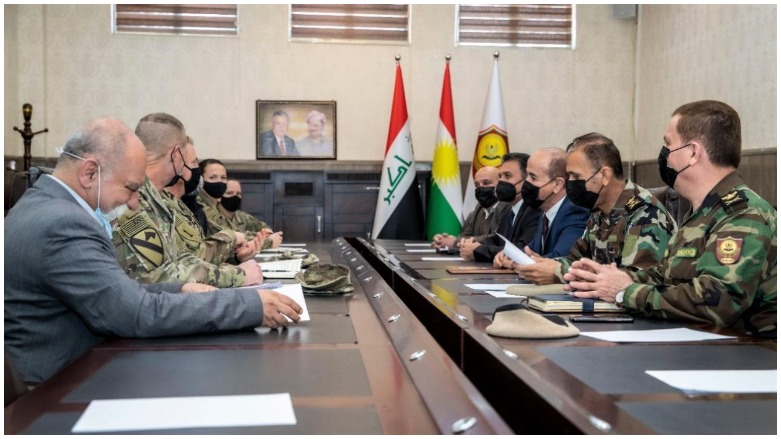Iraqi, Peshmerga forces plan to establish new joint media center in fight against ISIS
Peshmerga and Iraqi military officials both "expressed interest in similar goals and emphasized the importance of working together to defeat Daesh [ISIS]"

ERBIL (Kurdistan 24) – The US-led Coalition, Iraqi security forces (ISF), and the Kurdistan Region’s Peshmerga forces are planning to establish a joint media center to counter Islamic State propaganda and improve lines of communication between them, according to a Coalition press release on Monday.
Peshmerga and Iraqi military officials both "expressed interest in similar goals and emphasized the importance of working together to defeat Daesh [ISIS]" during a meeting at the Joint Coalition Coordination Center (JCCC) in Erbil on Feb. 17, the Coalition said on Monday.
The JCCC was established in 2015 to coordinate efforts between federal security forces and those from the autonomous Kurdistan Region in their fight against the extremist group.
Coalition spokesperson Col. Wayne Marotto told Kurdistan 24 that the media center is still in the planning phase.
"The relationship with the ISF and Coalition Forces is like that of a brother and it has been like that for 5 years and it still is," a Coalition press release quoted Ministry of Peshmerga media director Brig. Gen. Osman Mohammed Mustafa as saying.
The delegation discussed strategies for achieving long-term security and stability in Iraq, as well as continuing the liaison and cooperation between the Coalition, ISF, and Peshmerga forces.
When the Islamic State emerged in Iraq in mid-2014, the Kurdistan Region’s Peshmerga advanced to protect areas disputed with Baghdad and prevent the terror group from moving toward the Kurdistan Region.
However, after the Islamic State’s 2017 military defeat in the embattled nation, the Kurdistan Region held an independence referendum that September. Baghdad rejected the vote and imposed a set of punitive measures on the KRG, including a flight ban and the use of military force to regain control of territories disputed between the two.
Since then, security in those areas has deteriorated, enabling Islamic State sleeper cells to launch regular attacks against both government security forces and civilians.
A recent US Pentagon Inspector General report covering the last quarter of 2020 said that, to address the gaps in security, Coalition forces took steps to enhance joint ISF-Peshmerga coordination centers in Baghdad and Erbil.
The report quoted the Coalition stating that the Peshmerga had three officers in Baghdad’s coordination center and that the federal military had six officers stationed at the Erbil location to coordinate security efforts against the Islamic State.
In October 2020, the ISF and the Peshmerga agreed to continue to coordinate from these centers.
Major General Kevin Copsey, Deputy Commander of the US-led anti-ISIS Coalition in Iraq and Syria, told Kurdistan 24 that, unless Peshmerga and ISF "cooperate and coordinate operations together, ISIS will always be able to exploit violence from the KCL (Kurdish Control Line dividing Iraqi and Kurdish forces) until the Hamrin mountains."
However, he added that, in the end, to resolve the issue of territories disputed by Erbil and Baghdad, a political solution which has to be decided by the politicians is needed, saying, "There needs to be an agreement on the security (level) of what happens in the disputed territories regarding ISIS."
"But certainly as a Coalition," he concluded, "we do try to encourage and drive forward as much as possible the Peshmerga and the Iraqi security apparatus, both conventional and counter-terrorism, to actually to sew the seams of security across the KCL to stop ISIS from exploiting this."
Editing by Joanne Stocker-Kelly and John J. Catherine
